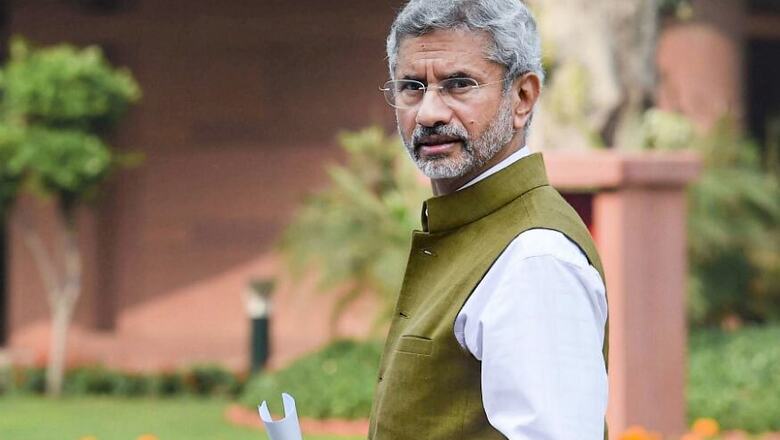
views
Pitching for an India-US partnership "beyond trade", External Affairs Minister S Jaishankar said on Wednesday that Washington should learn to work in a multi-polar world and beyond old alliances. He added that India and US can together lead the world out of crisis.
"I think the US really has to learn to work with a more multi-polar world with more pluri-lateral arrangements, go beyond alliances with which it has grown up in the last two generations," said Jaishankar at the Ideas Summit hosted by the US-India Business Council.
Speaking in a session titled: 'Leading in Times of Crisis: Perspectives on US Cooperation' attended by US Senator Mark Warner, Jaishankar said that Washington and New Delhi should focus on geopolitical basket and people-to-people ties as they have the potential to create a durable bilateral relationship.
"There are two big baskets to the issue we should be looking at. These are two drivers of a stronger relationship -- one is the geopolitical basket and other is people-to-people ties," Jaishankar said.
"Each one is game-changer in themselves and they reinforce each other. They have the potential to create a durable relationship between India and the US," the minister said, adding that beyond trade, there is a much bigger connect between India and the US which he called knowledge innovation.
The virtual summit will see a high-level presence from Indian and US government policymakers, state-level officials and thought leaders from business and society. Other key speakers at the summit include Prime Minister Narendra Modi and US Secretary of State, Mike Pompeo among others.
The India Ideas Summit will witness discussions on areas including India-US cooperation. The future of the relation between India and the US in a post-pandemic world will also be discussed in the summit.
Meanwhile, talking about trade issues between India and US, Jaishankar said, "For Indo-US relations, we need to think beyond trade. I learnt it a long time back that these are bread and butter issues. This is how countries deal with each other. Conversations are dominated by debates on trade problems. One important point is that India has changed as a country. It now has areas where it can make its presence felt. Established players generally want the rules that benefit then to stay that way. In a fair manner, genuine concerns of emerging players should also be considered. How well we harmonise that will decide our future course. And that is where we believe USICB will play an important part."
Here's The Full Transcript of His Speech
There are two big basket of issues that we should be looking at. These are the drivers in fat in the last 20 years of strong relationship. One is geopolitical and the second is people-to-people. Each one is a game changer in themselves. They reinforce each other, they have in the last 20 years.
They have the potential to create a very durable relationship between India and United States. Talking about the geopolitical aspect, The US really needs to learn to work in a multipolar world. Need to work more in a plurilateral arrangement. It needs to go beyond alliances that it has grown up with in the last two generations.
Now talking specifically of India, given our history of Independence and everything put together we are now coming together in different spaces. In the last two decades and I see that happen in the future the reality is to find more new common ground. We have the ability today to work together to shape the world.
Be it at maritime security counter terrorism, connectivity, In response to pandemic such as coronavirus we have also collaborated on climate change extra so the idea here is to keep working on our bilateral agenda and also play a part to shape a larger agenda. Mifi having worked with many previous administration. And in my experience working with various administrations including this one American policy makers have intuitively been going that way.
Now on the people-to-people side when America became independent there were three thousand Indian Americans living on the other side and perhaps a couple of million more Indian citizens on non immigrant visas. It has given a new face to the relationship and it has most importantly created a sense of bonding between the two cultures. And it is a bonding which is today very much centred around talent.
Innovation Technology quantitation Shepherd in a globalised knowledge economy work to my mind the key on the principles on which we should recognise and build a trusted talent. The key for this relationship is to recognise and build on trusted talent and creating more resilient supply chains in which both of us participate.
I understand the centrality of economic relations. I understood it during my days as a diplomat that is our bread and butter issues. These are what make countries deal with each other. But I think for India and the US while we work our trade issues we need to think bigger. I think for trade the last two years has been dominated by the conversation around your complaint in my complain. Beyond trade there is a larger connect between the two countries and the connect I believe is knowledge innovation based.
Apart from our strategies on exchange of goods, I think the ability to work together for innovation and technology is what will take us further. I believe that read issues need to be resolved and we need to work towards exploring the landscape that seem so similar to both the countries. However there is another point that needs to be made. Indian is also changing.
There are new capabilities that are emerging in India. There are domains and sectors in which we now have mastery which we did not have a few years earlier. Therefore you know our conversation is a reflection of a rebalancing act of the world economic conversation where up and emerging players have different concerns than established players. Established players want conversations around factors that help them to continue over the years. How well we harmonise that will decide our future course. And that is where we believe USICB will play an important part.



















Comments
0 comment